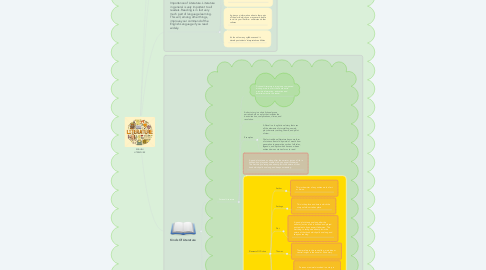
1. Introduction to English literature
1.1. Literature in English involves the reading and analysis of written materials of different kinds including fiction and non-fiction written works in English.
2. Definition Of Literature.
2.1. Literature is any body of written works that is written and produced in any country, language or age for a specific purpose such as information, education or entertainment to the reader, which can be fictional or non-fictional in nature.
3. Importance of Literature. Literature in general is very important to all readers. Reading is in fact very much part of language learning. This will, among other things, improve your command of the English Language if you read widely.
3.1. Literature improves your command of language
3.2. It teaches you about the life, cultures and experiences of people in other parts of the world
3.3. It gives you information about other parts of the world which you may never be able to visit in your lifetime – understand other cultures
3.4. It´s found in many syllabuses and it develops students’ interpretative abilities
4. Kinds Of Literature
4.1. Fictional Literature
4.1.1. Fictional Literature is imaginary composed writing or work of art that is meant to provide information, education and entertainment to the reader.
4.1.2. A short story is a short fictional prose narrative built on a plot that includes the basic situation, complications, climax, and resolution.
4.1.3. Examples
4.1.3.1. A Novel is a long fictional story that uses all the elements of storytelling, namely, plot, character, setting, theme, and point of view.
4.1.3.2. Oral or traditional literature has some form of stories often told by word of mouth from generation to generation such as folk tales, legends, and myths which have now been written down as stories for us to read.
4.1.4. A good plot draws us along after the narrator, just as a fish is hooked and played and reeled in by an expert fisherman. The first thing to recognize about plot is the nature of that hook which pulls us along and keeps us reading.
4.1.5. Elements Of Fiction
4.1.5.1. Author
4.1.5.1.1. This is the writer of any written work of art or fiction.
4.1.5.2. Settings
4.1.5.2.1. This is the place and time in which the story unfolds or takes place
4.1.5.3. Plot
4.1.5.3.1. A good plot draws us along after the narrator, just as a fish is hooked and played and reeled in by an expert fisherman. The first thing to recognize about plot is the nature of that hook which pulls us along and keeps us reading.
4.1.5.4. Themes
4.1.5.4.1. Theme refers to the controlling, main idea or central insight in the novel or short story.
4.1.5.5. Characters
4.1.5.5.1. Persons or animals involved in a story in order to show entertain and show us some truth about human experience and ourselves.
4.1.5.6. Style
4.1.5.6.1. Style refers to the way the novel or short story is written in order to have a desired effect on the reader or audience.
4.1.5.7. Language
4.1.5.7.1. Language is part of style, but it stands out to be the most important element of any fiction writing.
4.2. Non-fictional Literature
4.2.1. Non – fictional Literature is factual writing or written work that is gives facts that can be proved as it provides real places, events, characters, times or reality rather than imaginary things.
